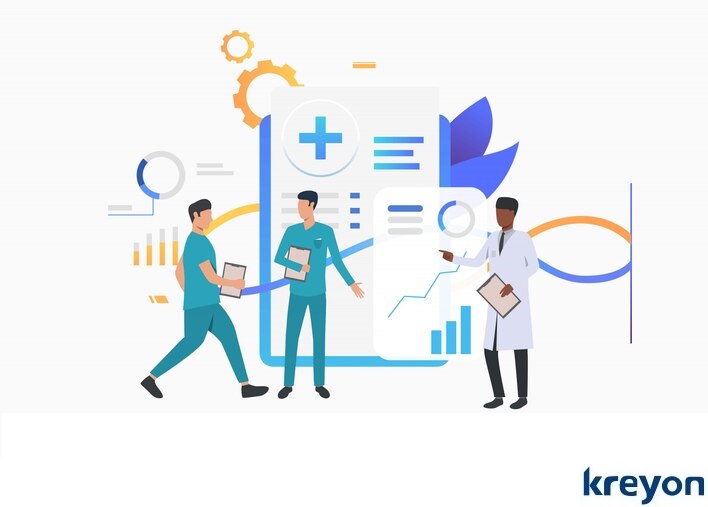Digital Trends in the Healthcare Industry

Digital trends in the healthcare industry are causing revolutionary changes in the way patients are treated. They are also transforming the ways in which healthcare facilities are managed. The data revolution, mobile connectivity and digital services are opening new frontiers for improvements.Today small wearable devices and mobile phones are able to gather data from a person’s day to day activity. The data streams can be analyzed to detect any healthcare anomalies and physical well being of people.
According to McKinsey, 76% consumers say they are moderately or highly likely to use telehealth services in the future. Telehealth services include doctor appointments, consultant services via video conferencing, mobile monitoring of health vitals, medical services, patient portals etc. The push for digital services has been accelerated after the COVID pandemic.
Here’s a look at some of the exciting digital trends in the healthcare industry for improved wellbeing & administration:
1. Personalised & Inclusive Healthcare
The proliferation of patient data and digital services can ensure personalised treatments. The patient profiling, diseases, response to treatments and lifestyles etc. is now collected by apps and healthcare software. AI and machine learning can create personalised treatments according to the data, which gives accurate assessment of health condition for every person.
Inclusive healthcare systems are geared towards providing preventive and healthier lifestyles. The software driven systems use algorithms to predict the best line of treatment and personalised clinical care for patient well being.
According to a PEW study, consumers are searching medical information online for the following reasons:
47% research doctors
38% research hospital and medical facilities
77% book medical appointments
2. Blurring Digital & Analog Worlds

The technology advancements are reducing the boundaries between the analog and the digital worlds. The healthcare practitioners are using all means to make optimum use of resources available at their disposal.
The hospital facilities, medical equipments, pharmaceutical and drug companies are all employing software services and apps to automate healthcare functions. The use of telehealth services for doctor consultations, medical treatment and even management of clinical functions are all aimed at maximizing cooperation to serve more people with existing healthcare infrastructure.
The digital services are increasing access to expanded healthcare access for more people. The contactless healthcare systems reduce human contact and thus prevent the spreading of communicable diseases. With online hospital services, patients can receive regular checkups, schedule consultations, and avail of treatment at their convenience.
3. Shared Knowledge Economy
Healthcare systems need to be equipped with the latest advancements in medical field, they should also communicate with the governments to co-ordinate on health policy matters. The shared knowledge base, online data and transparent policies are the basic requirements for delivering a full fledged healthcare system.
Knowledge gap can be detrimental to the working of a healthcare system. Take the e.g. of the vaccination drive for the COVID virus, the knowledge gap in treatment can be reduced using digital systems.
The digital services and online healthcare systems are aimed at improved collaboration between all the concerned stakeholders. The shared healthcare systems are driven by data, built for greater transparency and implementation of the global best practices.
Achieving “the greatest happiness of the greatest diversity” in healthcare means ascertaining and responding to the needs of every individual across a range of medical and wellbeing outcomes.
That can only be accomplished through wide-ranging collaboration among medical institutions, companies and governments. A shared knowledge base for implementation of the key healthcare policies, patient data and state of the art medical research can reduce the inefficiencies in the system and lead to improved healthcare outcomes.
4. Predictive Patient Care

Healthcare systems are increasingly using data and algorithms for predicting diseases at the earliest stages. For e.g. if the patient has a disease at an embryonic stage and can be detected using advanced algorithms, then with minimal lifestyle changes or medication the patient can be cured.
Predictive patient care uses data to promote well being for people. The predictive healthcare treatment helps healthcare institutions to make quick decisions. Predictive healthcare technology fits the data patterns and makes interconnections to fast track the diagnosis and treatment of patients.
The historical track record of patient data and reports also help in making the right decisions with respect to the treatment offered to individuals. The collaboration between specialist doctors can be coordinated to ensure the right medication to the patients. The checks and balances for treatment are assisted with a data driven system to achieve better healthcare for all.
5. Managing Staff & Facilities
The pandemic exposed the vulnerabilities and frailities of our healthcare systems. The apps and software that offer consultations, diagnosis and treatment are now woven into the fabric of healthcare providers. The healthcare system can increase the likelihood of patient receiving immediate attention when needed based on the criticality of the case.
The online systems provide doctors with accessibility to reach patients remotely. If the patient doesnt need to be admitted to the hospital or has minor systems, the healthcare software can indicate it as per the patient vitals. It reduces the workload on doctors, nurses and doesnt tax them unnecessarily. Many of the staffing challenges can be mitigated with good technological solutions.
The use of technology to manage the resources and facilities of the hospital reduces complexity of operations considerably. The pre and post surgery treatments can be implemented using software. The checklists employed by hospitals can be automated. Technology ensures that all equipments are up to date, availability of rooms, operation theatres, doctors etc. are managed efficiently to reduce downtime.
Kreyon Systems specializes in healthcare software solutions and apps for managing resources efficiently, connecting with patients & building telehealth services. If you have any queries for us or need help in implementation, please reach out to us.
